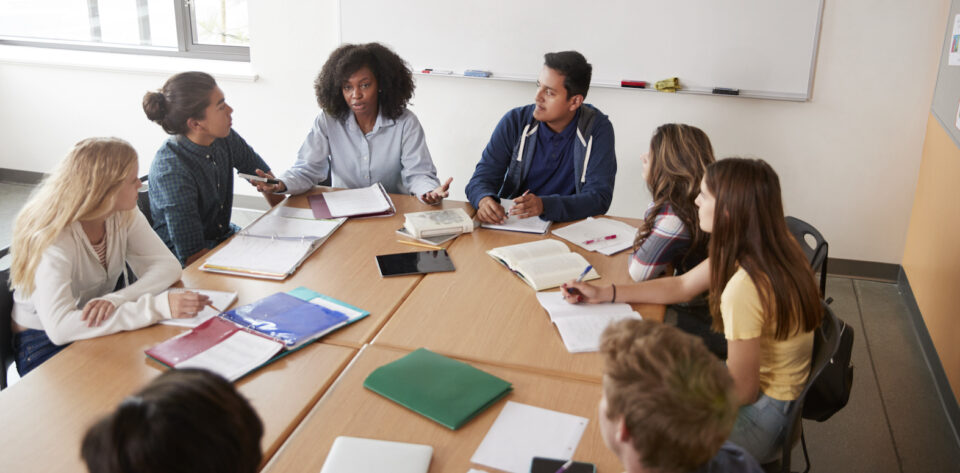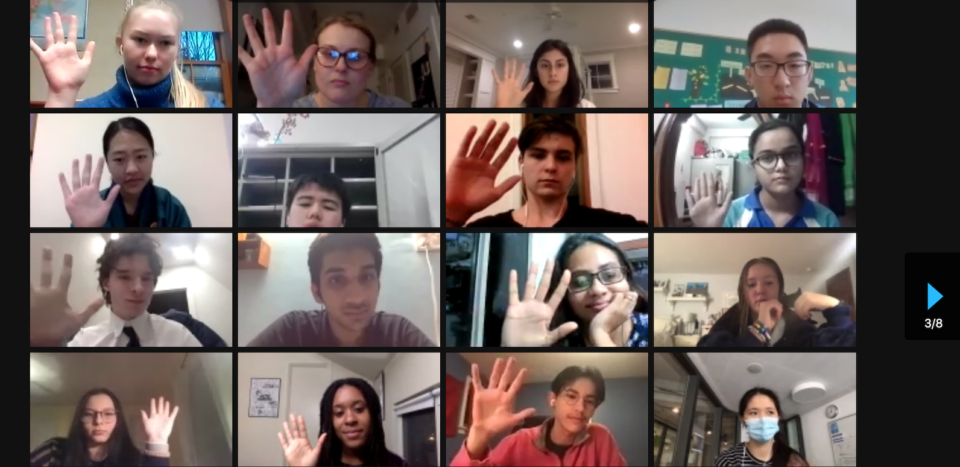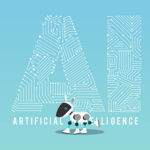GEBG’s Global Student Dialogues provide students the opportunity for intercultural dialogue and connect thousands of students with their peers from schools across North America and more than 25 countries around the world. These dialogues have addressed topics of global significance such as climate change and gender equality, topics related to global current events such as the ongoing war in Ukraine, and various UN Sustainable Development Goals in order to develop the student intercultural communication and perspective-taking.
With the guidance of facilitators, students engage in conversations in small groups, share their experiences and thoughts on the topic and practice essential skills related to respectful civil discourse.
Students report that the two skills they most practice in this program are listening for understanding and listening with empathy. GEBG has developed and hosted this year’s dialogues with the generous support of the E.E. Ford Foundation.

2024 Student Dialogues
UN SDG 16: What does freedom of expression mean to you and the youth in your community?
High School Student Dialogue
Wednesday, April 3, 2024 // 6:00-7:00AM Pacific / 9:00-10:00AM Eastern / 3:00-4:00PM Central European / 6:30-7:30PM Indian // Scarsdale High School // Register here
Essential Questions:
What does speech and activism look like at your school? In your community?
Have you engaged in any form of activism? If so, then what did it look like?
How do cultural norms impact the attitudes surrounding speech and expression?
Have you seen this impact anyone around you?
How do people express themselves coming from different genders, races/ethnicities, and backgrounds?
US History Dialogue Series: How much influence should the Federal Government have over the country?
High School Student Dialogue
Thursday, April 18, 2024 // 1:30-2:15PM Pacific / 4.30-5.15 PM Eastern / 10:30-11:15 PM Central European // Hosted by Flintridge Preparatory School // Register here
Essential Questions
How much influence should the Federal Government have over the country?
How has this battle for federal vs. state control impact your identity/decisions?
How much power should the courts have over civil liberties and rights?
US History Dialogue Series: Did Reconstruction really end in 1877? How did Reconstruction impact institutional racism?
High School Student Dialogue
Wednesday, April 24, 2024 // 8:00-9:00AM Pacific / 11:00AM-12:00PM Eastern / 5:00-6:00PM Central European // Hosted by Flintridge Preparatory School // Register here
Essential Questions
In your opinion, how successful was Reconstruction?
What do you think the goals of Reconstruction should have been?
What policies would you implement if you were in charge of Reconstruction? How?
Why did Reconstruction fail?
How could the Republicans have made Reconstruction more successful with what they had?
To what degree has Reconstruction affected institutionalized racism? How?
How important was it to put the Union together quickly?
Artificial Intelligence
High School Student Dialogue
Tuesday, April 23, 2024 // 9-10AM Pacific, 12-1PM Eastern, 6pm Central European // Hosted by Appleby College // Register here
Middle School Student Dialogue
Tuesday, April 30, 2024 // 9-10AM Pacific, 12-1PM Eastern, 6pm Central European // Hosted by GEBG // Register here
Essential Questions:
How does AI have an impact on your daily life?
What changes do you think can be made to AI to impact society?
Do you feel that AI takes away from people’s privacy?
What are some ways you think AI can be used to have a positive effect on the Global Scale?
Will it be challenging to use AI globally if each country is protective of their own data?
What are some improvements you are seeing in your life now that are influenced by AI?
What is a major change for the Earth that AI can help with?
UNIQUE SUMMER 2024 OPPORTUNITY
Global Competence Certificate for Students
GEBG is partnering with AFS to offer a Global Competence Certificate Program for students ages 14-17. The program includes a combination of AFS-developed asynchronous online coursework as well as synchronous GEBG-facilitated dialogues. Students in this program all come from GEBG Member Schools and will interact with one another in a GEBG-exclusive asynchronous platform and in dialogues facilitated by trained GEBG facilitators.
The Global Up Teen program is a one-of-a-kind, virtual program, open to teens (aged 14-17) to develop key global skills for the emerging future and build bridges across cultures, all while becoming part of a truly global community. Global Up Teen features a closed, minors-only platform for connecting and sharing with other learners worldwide.
Participants who complete the program will receive a certificate to accompany the new knowledge, skills, and attitudes developed through the program. Completion of the program involves doing all of the asynchronous coursework as well as attending one of each of the four Facilitated Dialogue Sessions (each offered twice during the times below). Students can also participate in the program without earning a certificate, if they so desire.
PROGRAM CURRICULUM
DISCOVER
- Welcome & Roadmap
- Metaphors of Culture
- Who Am I?
- Leaving your Comfort Zone
- Exploring Perspectives
DELIVER
- Stereotypes & Generalizations
- Empathy & Listening
- Suspending Judgment
- Cultural Value Dimensions
- Communication Styles
DEEPEN
- Dealing with Conflict
- Coping & Being Resilient
- Understanding Inequality
DEBRIEF
- Power & Privilege
- Skilling Up for the Future
- Taking Action
During each of the live Facilitated Dialogue Sessions (FDSs), students will engage in full-group facilitated discussions, led by a trained GEBG-AFS facilitator, as well as indirectly supervised breakout discussions—the facilitator will remain in the main Zoom room, but students will be alone in 4-6 student breakout rooms, with the ability to return to the Main Room at any time. At least two adults from GEBG will be present in the Main Room during these sessions at all times.
Students need to be registered by a supervising adult at their school who will be responsible for supporting their school’s participant/s. This support is mostly through facilitating registration and helping to respond to any needs that might come up, but these adults do not need to attend any of the live dialogue sessions or to take the course themselves.
+ FORMAT: Asynchronous online coursework (10-12 hours) and four synchronous, virtual dialogues
+ COST: $250 per participant, member schools only
+ AUDIENCE: Students ages 14-17
+ DATES: June – August // A certificate for the course requires full participation in 4 synchronous Facilitated Dialogue Sessions which cover 4 different content areas. Each session is offered at two different dates and times.
Dialogue #1:
Thursday, June 13, 2024 // 12-1.30PM Pacific / 3-4.30PM Eastern / 9-10.30PM Central European
or
Tuesday, July 16, 2024 // 3-4.30PM Pacific / 6-7.30PM Eastern
Dialogue #2:
Thursday, June 27, 2024 // 12-1.30PM Pacific / 3-4.30PM Eastern / 9-10.30PM Central European
or
Tuesday, July 30, 2024 // 3-4.30PM Pacific / 6-7.30PM Eastern
Dialogue #3:
Thursday, July 11, 2024 // 12-1.30PM Pacific / 3-4.30PM Eastern / 9-10.30PM Central European
or
Tuesday, August 13, 2024 // 3-4.30PM Pacific / 6-7.30PM Eastern
Dialogue #4:
Thursday, July 25, 2024 // 12-1.30PM Pacific / 3-4.30PM Eastern / 9-10.30PM Central European
or
Tuesday, August 27, 2024 // 3-4.30PM Pacific / 6-7.30PM Eastern
A designated school representative needs to complete registration for any student from their school and will act to support the student in conjunction with GEBG Program Leaders. During registration, the school representative will select to bill the student’s family or the school.
Partnership Driven Dialogues
Integrating dialogue into the curriculum of a course or program allows educators to support participants in adequately preparing for, meaningfully engaging in, and thoughtfully debriefing an intercultural experience; however, one of the greatest challenges to doing so is the partnership development and logistical complexities required to make such an opportunity available to students across a school community.
As a result, GEBG has developed a distinct approach to our dialogues program in the 2023-24 School Year:
>> Classroom teachers, program directors, advisors, or school administrators can submit their interest in participating in intercultural dialogue/s, indicating their preferred timing and topics of interest.
>> GEBG will take these preferences into account and partner educators from across the network, supporting the identification of common goals and determination of an appropriate structure to pursue those goals.
>> Participating educators and students will have access to new resources, including a comprehensive handbook on intercultural dialogue filled with models and tools, online facilitator training courses for students and educators, and coaching for leaders of these initiatives across grade levels and disciplines.
We will be sharing these opportunities throughout the school year. If you are interested in hosting a Student Dialogue, email info@gebg.org

GEBG Dialogues Leading Partner Schools

Through an exciting new grant from The Edward E. Ford Foundation, GEBG is expanding our Global Student Dialogues program focused on intercultural dialogue and civil discourse and develop accompanying competency-based curricular resources adaptable for use by educators.

2022-2023 Leading Partner School Achievements
In partnership with our select group of 22 Leading Partner Schools, we engaged over 1000 middle and high school students from 10 different countries in active intercultural dialogue on global issues. We experimented with a number of models for our virtual dialogues, varying our timing; the length of each session; and also added student facilitators in late spring. Students reported communicating with people who were different from them, listening for understanding, listening with empathy, and understanding a perspective other than their own as the top skills they were able to authentically practice in this program.
Student leaders involved in the Student Leadership Council helped guide the topics and format of all our dialogues, as well as developed their leadership and facilitation skills in partnership with peers from over 20 different schools. Adult representatives serving on the Educator Advisory Council provided essential contributions towards our publication of a guidebook on Intercultural Dialogue for schools. The Council identified the areas of most meaningful growth, and drafted materials that will be shared with our wider independent school community next school year. The leadership and insight of this group guided our dialogues as well as provided insight that will shape student learning around intercultural dialogue at independent schools throughout North America and well beyond.
Appleby College (ON)
Academy of Notre Dame de Namur (PA)
Buckingham Browne and Nichols School (MA)
Brewster Academy (NH)
Castilleja School (CA)
Columbus School for Girls (OH)
Flintridge Preparatory School (CA)
Friends Seminary (NY)
Groton School (MA)
Holton-Arms School (MD)
Lower Canada College (QC)
Miami Country Day (FL)
Palmer Trinity School (FL)
Polytechnic School (CA)
Providence Day School (NC)
Rye Country Day School (NY)
St. Andrew’s Episcopal School (MS)
St. Mary’s Episcopal (TN)
St. Mark’s School (MA)
Holy Innocents’ Episcopal School (GA)
Pace Academy (GA)
McDonogh School (MD)
DEVELOPED BY OUR LEADING PARTNER SCHOOLS
Intercultural Dialogue: A Field Guide for Educators & Schools
This over 100-page publication, the first of its kind in the K-12 Global Education field, helps educators and student leaders seeking to bring dialogue into their classrooms and programs access model practices that help their students and peers learn competencies like perspective-taking and intercultural communication. 22 schools from within the GEBG Network have contributed to this publication; from those 22 schools, 22 school educator-leaders and 54 student leaders were directly involved in the drafting of various sections of the publication throughout the course of the past two years. This publication will be accessible in the coming months.


